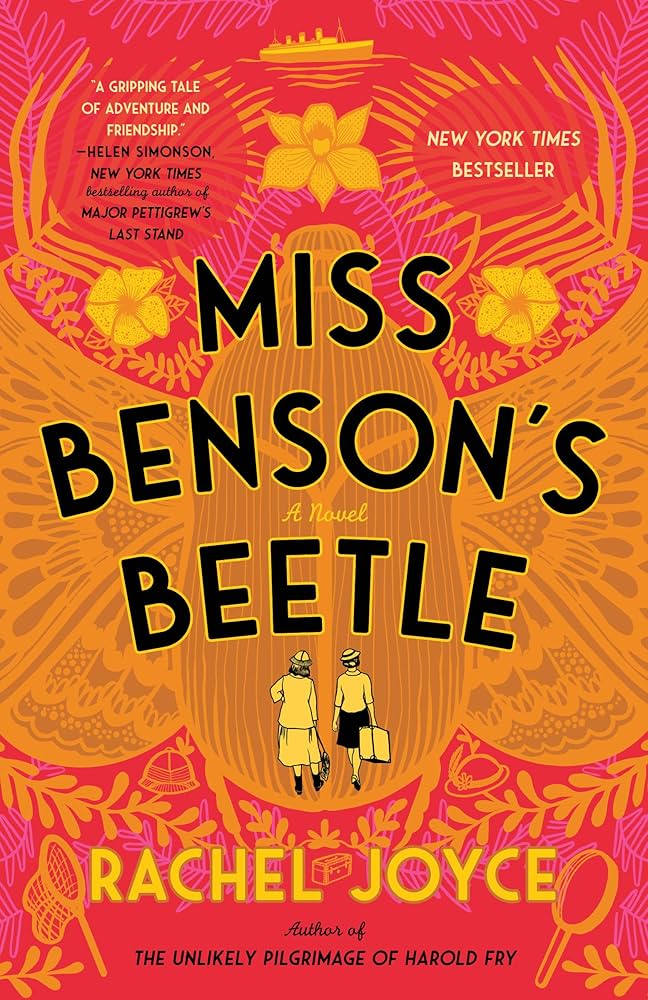
Share
Exploring the Heart of Friendship: A Review of 'Mrs Benson's Beetle' by Rachel Joyce
How a Beetle Hunt, a Pink Suitcase, and an Unlikely Friendship Led to the Adventure of a Lifetime, and a Discovery That Would Change Everything
July, 9, 2025

Suppose your idea of a midlife crisis involves sensible shoes, a copy of The Boys' Book of Beetles, and an impulsive one-way ticket to New Caledonia. In that case, you and Miss Margery Benson have more in common than you might think.
Set in the early fog of the 1950s—when Britain was still licking its post-war wounds and rationing custard powder—Rachel Joyce's Miss Benson's Beetle is a gloriously eccentric, surprisingly moving novel about a woman who has, in every sense, had enough. Enough of chalkboards and corseted routine. Enough of spooning out other people's dreams. And enough, above all, of playing it safe.
Miss Benson, a stout, repressed schoolmistress with beige clothes and beige regrets, has spent her life in a kind of sepia-toned mediocrity. Her father once told her about a mythical golden beetle in New Caledonia—a glowing, undiscovered marvel of the insect world—just before promptly shooting himself after receiving word that all four of his sons were dead at Mons. That memory sits buried in Margery's gut like a fossil waiting to be unearthed.
Then one day, while attempting to teach a lesson no one listens to and wearing shoes that might as well be cement blocks, Margery snaps. It's not a loud snap. No plates are hurled. No students screamed at. But she walks out. She decides, quite madly and magnificently, to go and find that golden beetle. That golden childhood. That golden life she never got to live.
Enter Enid Pretty. If Margery is a chipped teacup from 1937, Enid is a glittery cocktail shaker left on the beach after V-E Day. Blonde, brash, loud, with a pink suitcase and a frothy laugh, Enid is the last person Margery wants accompanying her on an expedition through the South Pacific. But circumstances, as they often do in Joyce's novels, conspire to throw them together.
What follows is part farce, part field guide to emotional survival. The journey is textbook British adventure—steamships, jungles, tents that won't stay up, and the constant looming threat of sunstroke. But Miss Benson's Beetle isn't just about jungles and bugs; it's about emotional unthawing. It's about what happens when two people who've been dismissed by society—one for being too much, the other for being not enough—start believing in each other's potential. Their journey is a testament to the power of courage and the inevitability of change.
Joyce, known for The Unlikely Pilgrimage of Harold Fry, once again proves she's a master at writing what we might call "quietly epic" stories: intimate journeys that feel, by their end, like triumphs of mythic proportions. Her signature trick is to take characters we might initially write off—middle-aged women in cardigans, lonely hearts on park benches—and set them spinning into quests that make us sit up straighter and reconsider everything we thought we knew about purpose.
There's a great deal of charm in the capers that unfold, but Joyce never lets things get too sweet. There is absolute darkness here. The war, though officially over, haunts the novel like a gas leak. A mentally unwell man follows them, convinced he must protect—or perhaps control—Miss Benson. His presence, drawn with empathy rather than villainy, reminds us that everyone in this story is trying to find their footing in a world that has upended their sense of direction.
Yet, the beating heart of the novel is the relationship between Margery and Enid. Their odd couple dynamic—one rigid, the other riotous—shifts from comic friction to genuine tenderness. Enid, who initially seems like she belongs on a magazine cover rather than in a jungle, reveals layers of courage, pain, and loyalty. Margery, for all her starchy edges, learns that bravery sometimes comes in rhinestone sunglasses and heels.
Their friendship is an anthem to the unexpected. It's a celebration of what can happen when we stop chasing after people we 'relate' to and start opening ourselves to those who challenge and change us. As Joyce writes, 'She didn't know how she was going to get there, or when. But the real failure as a woman was not even to try.' That line could be the novel's mission statement—and indeed, the mission statement of anyone tired of living life on pause. It's a reminder to be open-minded and receptive to the unexpected friendships that can change our lives.
By the final chapter, you're not only rooting for Margery to find the beetle—you're also reminded that the most astonishing discoveries are the ones we make about ourselves, and about those we thought we had nothing in common with.
In short, Miss Benson's Beetle is a spangled, big-hearted triumph of a novel. It made me laugh, made me ache, and made me want to call the most unlikely friend I've ever had and thank them for showing up. Because sometimes, all it takes to change your life is a ticket, a beetle, and someone you never saw coming.
